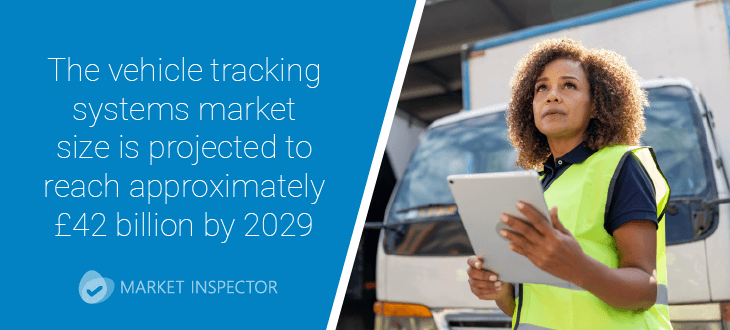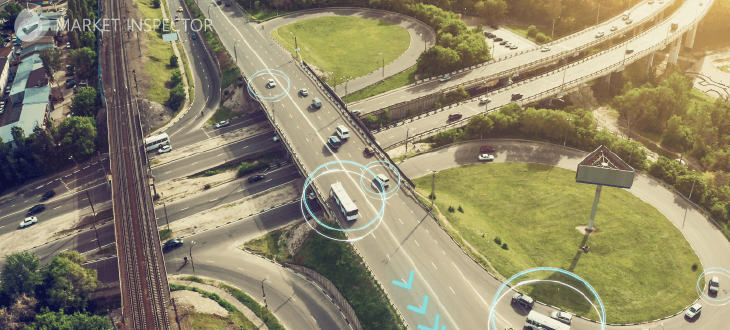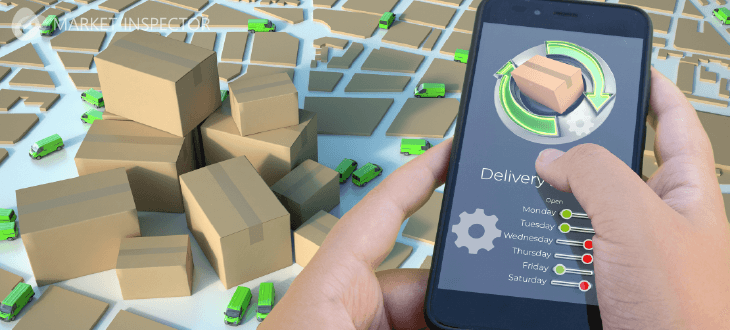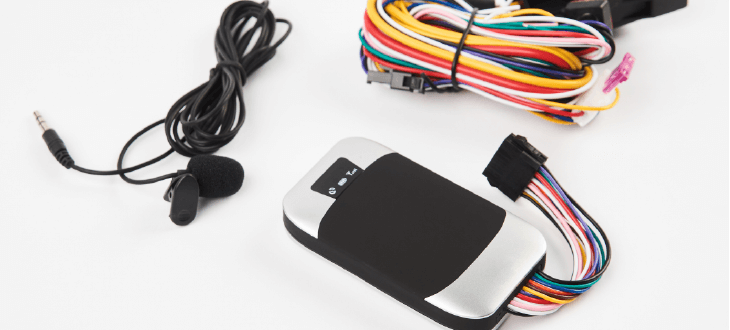Answer these simple questions and we will find you the BEST prices
Which type of solar quotes do you need?
It only takes 30 seconds
100% free with no obligation

Get up to 4 quotes from our selected suppliers by filling in only 1 form

Save money by comparing quotes and choosing the most competitive offer

Our service is 100% free and with no obligation
- Market-Inspector.co.uk
- Vehicle Tracking
- Car tracking
Vehicle Tracking: What is Car Tracking?


- Vehicle tracking systems serve a multifunctional role within businesses, particularly in enhancing vehicle security and ensuring regulatory compliance.
- Car tracking uses GPS technology to monitor vehicles in real time, providing data on location and usage to help businesses optimise fleet management and reduce costs.
- The vehicle tracking systems market size is projected to reach approximately £42 billion (USD $52,4 billion) by 2029.
The market for vehicle tracking systems is expected to grow to approximately £42 billion (USD $52.4 billion) by 2029, according to a GMI Research report. This study examined the global market size for vehicle tracking systems, exploring growth prospects, market trends, and revenue potential.
Considering this bustling business landscape, efficiency and security are paramount - especially when managing commercial vehicles. Vehicle tracking technology has emerged as a cornerstone of modern fleet management, offering companies benefits that extend far beyond mere location tracking.
Read on to be well-informed on car tracking, why it is important, how it works, and how to decide if your business needs it.
We encourage you to obtain multiple quotes from reputable providers to make the most informed decision and ensure you get the best value. Compare these options to find a solution that meets your specific needs and enhances your fleet management strategy.
- Describe your needs
- Get free quotes
- Choose the best offer
It only takes 30 seconds

What is car tracking?

As a business owner, you might wonder, "What is tracking on a car?". It involves using a device to monitor the location and movement of a vehicle in real-time.
According to Bobit Fleet Group’s research-based report titled: GPS Vehicle Tracking: A Start-Up Guide for Your Business, car tracking consists of a tracking device installed within the vehicle, paired with sophisticated software that processes and displays the data.
This technology allows for real-time monitoring and historical data analysis of vehicle movements and behaviours, providing a comprehensive overview of vehicle usage.
Car tracking systems utilise GPS technology to pinpoint the exact location of a vehicle, offering detailed insights into its route, speed, idle times, and more. This information is crucial for optimising routes, enhancing efficiency, and improving overall fleet management.
Tracking software
Car tracker companies provide solutions like fleet management GPS tracking, which are essential for monitoring vehicles.
GMI Research highlights that the software used in vehicle tracking systems can integrate a wide range of data inputs. These include real-time location tracking, route history, vehicle speed, idling times, and detailed reports on stops and other behaviours.
This integration is crucial for businesses as it allows them to monitor fleet activity with precision and make informed decisions to optimise operational efficiency and reduce costs.
Moreover, according to the guidelines found on the UK government's website regarding the management of van fleets, the software also supports compliance with regulatory standards. It helps in scheduling maintenance, and ensuring vehicles are operationally safe and compliant with environmental regulations.
The software can alert fleet managers about necessary service checks, which helps prevent downtime and extends the lifespan of the fleet.
Overall, the software in vehicle tracking systems is pivotal in transforming raw data from tracking devices into actionable insights.

What is the purpose of tracking a car?
The reasons for employing car tracking systems are varied, they range from business to business. We have listed the most common purposes of car tracking and their associated advantages.
Fleet management
To optimise fleet operations, businesses can fit trackers to cars. The use of car tracking for fleet management involves enhancing the coordination and operation of a fleet of vehicles.
It allows businesses to monitor vehicle locations and statuses in real-time, enabling better dispatch decisions and fleet utilisation. This aspect is crucial for businesses that rely on timely deliveries and service provision, as efficient fleet management directly impacts customer satisfaction and business reputation.
Vehicle security
Car tracking plays a vital role in vehicle security by offering protection against theft and unauthorised use.
With real-time tracking capabilities, businesses can quickly respond to unauthorised movements, significantly reducing the risk of theft. This not only protects the asset but also helps in reducing insurance costs, as insurers often offer better rates for vehicles equipped with tracking systems.
Monitoring and safety
Ensuring driver compliance with safety protocols and guidelines is another critical purpose of vehicle tracking.
By monitoring driving behaviours, such as speed, braking, and route adherence, businesses can identify risky behaviours and provide targeted training to improve safety.
This monitoring helps in reducing accident rates, enhancing overall road safety, and ensuring compliance with regulatory standards.
Operational efficiency
Optimising routes and fuel usage are central to improving operational efficiency. Car tracking systems provide data that help in planning the most efficient routes, avoiding traffic delays, and reducing idle times.
This leads to lower fuel consumption and maintenance costs, which are significant expenses for any fleet-operated business.
Moreover, efficient operations ensure that services are delivered more promptly, enhancing customer satisfaction and loyalty.
Ensuring compliance with driving regulations
Ensuring that drivers adhere to set routes and schedules can help businesses comply with driving time regulations and other legal requirements.
Tracking systems can alert managers when drivers deviate from their routes or engage in unsafe driving behaviours, allowing for immediate corrective action.
This is crucial not only for compliance but also for maintaining the safety standards of the fleet, reducing the risk of accidents and associated liabilities.
Enhancing customer service
Research from Vimcar, a fleet management platform, all the above factors contribute to better customer service. Real-time tracking ensures that customers are kept informed about the status of deliveries, leading to improved satisfaction levels.
For service-oriented businesses, this capability to provide accurate, up-to-date information to customers can be a significant competitive advantage, fostering trust and reliability.
As outlined in the Vimcar resource, these primary purposes of vehicle tracking systems highlight their essential role in not only managing but also strategically enhancing various aspects of business operations, directly impacting customer service excellence and overall business success.
These purposes highlight the multifaceted benefits of vehicle tracking, making it an indispensable tool for businesses aiming to secure their assets, enhance operational efficiency, and safeguard their employees.

How does a car tracking device work?
A tracking device on a car is a small, GPS-enabled apparatus installed covertly within a vehicle. You may ask yourself, “So, what does a car tracker do?”. Let’s take a look below.
Its core function is to continuously collect data about the vehicle's geographic location and movement patterns, according to insights from fleet management solutions provider MiX by Powerfleet.
The technology behind a car tracking device revolves around Global Positioning System (GPS) technology. The device receives GPS signals from satellites, which allow it to calculate the vehicle's exact position on Earth.
This location data is then transmitted back to a central server using cellular networks. Once received, this data is processed and organised into a comprehensive dashboard accessible via web or mobile applications, enabling real-time and historical tracking of the vehicle.
Beyond simple location tracking, modern car tracking devices incorporate a variety of additional sensors that enhance their functionality.
According to insights from the Mix by Powerfleet Telematics papers, these devices can monitor several critical vehicle parameters, including engine health indicators, fuel consumption rates, and specific driver behaviours such as speed, idling time, and braking patterns.
This enriched data collection is crucial for businesses, as it allows for detailed analysis of vehicle performance and driver efficiency, providing actionable insights into fleet management.
These advanced capabilities help businesses optimise operational efficiency by improving route planning, reducing unnecessary fuel expenditure, and enhancing overall fleet safety.
Moreover, integrating such comprehensive data monitoring tools supports proactive maintenance strategies, reducing vehicle downtime and extending the fleet's lifespan. Through detailed behaviour monitoring, businesses can also ensure compliance with driving regulations and improve safety standards, contributing to more secure and efficient fleet operations.

How do you know if your commercial vehicles need tracking?
Deciding whether your business could benefit from vehicle tracking involves recognising key indicators that highlight inefficiencies and potential risks in fleet operations. Whether you are looking for a car tracker or a truck tracker, here are the primary indicators suggesting a need for implementing a vehicle tracker.
- Frequent misuse or unauthorised use: If your vehicles are often used without permission or for non-business purposes, a tracking system can deter and detect such activities, safeguarding your assets. This aligns with findings from telematics solution provider, Geotabs' white paper on How telematics data is saving small businesses thousands. The paper emphasises the necessity for tighter oversight due to recurring misuse.
- Operational inefficiencies: Difficulties in managing routes, schedules, or fuel consumption effectively indicate that tracking could enhance operational coordination and control. Tracking systems provide real-time data that helps optimise these aspects by ensuring vehicles are efficiently routed and schedules are adhered to.
- Safety and compliance concerns: The need to monitor driver behaviour and ensure compliance with safety regulations is crucial. Vehicle tracking systems can help enforce safety standards by monitoring driving practices and providing data to support compliance with regulatory requirements.
- Asset security: With vehicle theft and tampering being significant concerns, tracking systems offer a layer of protection, allowing for real-time monitoring and quick responses in case of an incident. Implementing a vehicle tracking system could be a transformative step for your business if you're experiencing any of these challenges.
Get multiple quotes on vehicle tracking
To ensure you're getting the best value and service for your vehicle tracking needs, it is wise to obtain multiple quotes from different providers.
This not only gives you a better understanding of the pricing landscape but also offers insights into various service options available in a short space of time.
By comparing these quotes, you can make a more informed decision that aligns with your business requirements and budget.
- Describe your needs
- Get free quotes
- Choose the best offer
It only takes 30 seconds

FAQ
Car tracking involves using technology to monitor and analyse the location and behaviour of vehicles.
The primary purposes include fleet management, vehicle security, monitoring and safety, and improving operational efficiency.
If your business experiences operational inefficiencies, unauthorised vehicle use, safety and compliance issues, or concerns over asset security, car tracking could be beneficial.

Nicole Bea Kerr is a content writer for Market Inspector, leveraging her experience in B2B journalism and editing. She is interested in bringing more awareness to sustainability and helping businesses make informed choices through insightful narratives.
We strive to connect our customers with the right product and supplier. Would you like to be part of Market Inspector?

